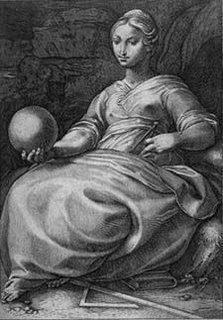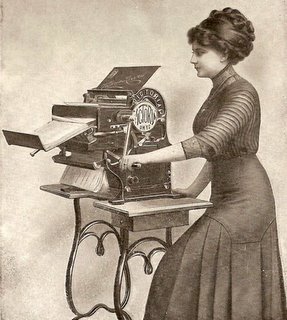Hypocrite Lecteur

A Poet and his Reader Prepare Themselves for a Round Around the Indoor Track.
But which is which?
Do you remember when computer salesmen told us that computers would reduce the amount of paper in our lives? For your sake, I hope you’re too young for that disappointment, but chances are, with our collective demographic slide into Grecian Formula, you remember well enough.
If you could just dig yourself out from underneath the darn stuff, that is.

(1940s)
Oh, yes, you can’t avoid it forever; life is a series of betrayals, sure. Sure. Sure, heard all that before. We’re in this all together — heard that, too. Take my grandmother, for instance, Martha Marsel, born in 1904, Breslau.
1904. Breslau. Man, there isn’t even a Breslau anymore.

No matter.
No matter, because for Martha, it was about paper, too. Not Greater London’s recycling program. Not Scotties Little Softy. And not 20 lb. bond, 84 bright, of course, on sale this week down at Staples, no. Not even 20% post consumer recycled, with the stretch marks to show for it. Nope. For her, for Grandma herself, who came through the Depression with a depression and a collection of flour sack dresses that even Immelda Marcos wouldn’t be able to match with shoes, it was about paper dishes and paper clothes: the great disappointment in Martha’s life.
That’s what it was.

British Airways Stewardess in a Paper Dress
Yes, it seems that some advertising folks had assured Martha, during the Second World War, if I remember correctly her disappointment, that in her time a woman’s work would vanish. In her time! Maytag dishwasher? Pshaw! Throw the plates away. Wipe up with a paper towel. Done! Wringer washer, or, for her, yes, a washtub? Nothing doing! Throw the skimpy duds away after one wear. Sure beats those old flour sack dresses. Sure does.
It’s kind of like I Dream of Jeannie!
That’s what it is.

Barbara Eden's navel was banned by the network in the original "I Dream of Jeannie." By "I Dream of Jeannie: 15 Years Later" standards had changed, and the navel winked at the world.
The Empress, it seems, was, in the end, not wearing any clothes.
Of course, as the world knew, next to the earlobe, the navel is the most socially acceptable place to ante up to the hardware plate.
Healing Time? 3-6 months.
Hypocrite Lecteur: Not so fast, huh.
Auteur: Ah, but, not so fast yourself. Here’s the Muse herself, the Goddess of poetry. I think she’s contemplating giving up the whole romantic love project for motherhood. That inward, centred gaze, that roundedness. It’s a giveaway.
Hypocrite Lecteur: 9 months, more like.

All Wrapped Up in a Flemish Fabric Mill and
Holding the Whole World in Her Good Hand
(sans continents)
by Hendrik Goltzius.
(I think the other hand had an argument with the machinery.)
Oh, do you hear that? Can you make it out?
Hypocrite Lecteur: Why, I think I hear readers waking from their Eternal Rest.
Auteur: Shh!
Hypocrite Lecteur: Let’s listen, shall we...
Eve (Waking from a nap. She peers.): Honey? (She shakes Adam by the shoulder.) What’s that stuff in the background of Erato’s bedchamber?
Adam (Peers.): Rocks. (Casually.) Just rocks. Just old ruins and stuff. Rocks. It’s nothing. Pshaw. Go back to sleep.
Erato (Stage whisper.): Oh, Evi. Here, let me blow those rocks up a little for you.
Adam (Breaking out into a sweat.): Oh, that’s not necessary.
Erato (blows Adam a kiss): Inspiration is inspiration, darling. Necessity doesn’t enter into it. If you’ve got the technology, use it. Don’t hold back. Are you holding back, Adi? Adi?
Adam: (Blush).
Eve: Who are we talking to dear?
Hypocrite Lecteur: Yourselves. Who do you think?

Green: Captain Hook
Yellow: Kilroy Was Here
Blue: Munch’s The Scream
(I’m not making this up. Really!)
Hypocrite Lecteur: Adam, you dog!
Adam: Shh! Keep it down, would you.
Eve: Adi....
Let’s close the door on this little melodrama, shall we, while the Happy Couple sorts it out about just how Adam got to be in Erato’s bedchamber.
Of course, we know better. Robin Skelton was a poet who sang his songs to the muse as well as anyone. He believed that there was only one woman who ever lived, and one man, whose story we tell ourselves over, and over, and over again.

In His Trademark White Suit
Doing his best Gandalf impression
and getting ready to start telling the one story
all over again
Hypocrite Lecteur: How does that repetition come about? Good grief.
Auteur: I’m glad you asked. Evidence abounds. For example, just below there’s an updated picture of Erato, from 1913, when Martha wasn’t even old enough to take First Communion. (Note: Martha was a good catholic girl at that time, and just like the last time, in Goltzius’s 16th Century, Erato’s wearing her sheet along the sweet curve of her thigh, and just like the time before, her head is all tucked and pinned.)Little known factoid: the goddess of lyric poetry has suffered for centuries from massive headaches.
I mean, it can’t be easy to hold all that stuff up. Move your head too quickly and, wham, you’ve lost your equilibrium, that’s what.
For women like that, ballet was not an aesthetic pursuit. It was chiropractry.
Who knew?

The Muse Keeps Her Eyes on Her Victorian Copier
No Flour Sack Dress for her! Nossir. (Note how she has removed her sewing machine from the table, and replaced it with this little number.)
The muse is a girl on the move, isn’t she! She knows how to change with changing times.
Hypocrite Lecteur: No wonder all those fin de siècle poems were rhymed and in the rhythms of a metronome, though.
No wonder modernist poets like T.S. Eliot got to thinking that poetry could be produced by machine. Check out the rhymes in his original draft of The Waste Land, before Ezra Pound scribbled them all out. Ezra Pound, medievalist, who studied fencing at university, actually.
Hypocrite Lecteur: No wonder new formalist poets want those rhymes back.
No wonder paper dresses didn’t catch on.
And just think. Just think where it all started: in Goethe’s garden.
Hypocrite Lecteur: Goethe’s Garden?
Adam and Eve (Together, as one): Garden?
Auteur: Yes, take a look:

So, that’s where it got to!
Eve: Adam!
Adam: (Blush.)
And that, folks, is how poetry came to look, up to the modern age.
Next Week: The Modern Age
Next Week, too: Flat Earth Theory

0 Comments:
Post a Comment
<< Home